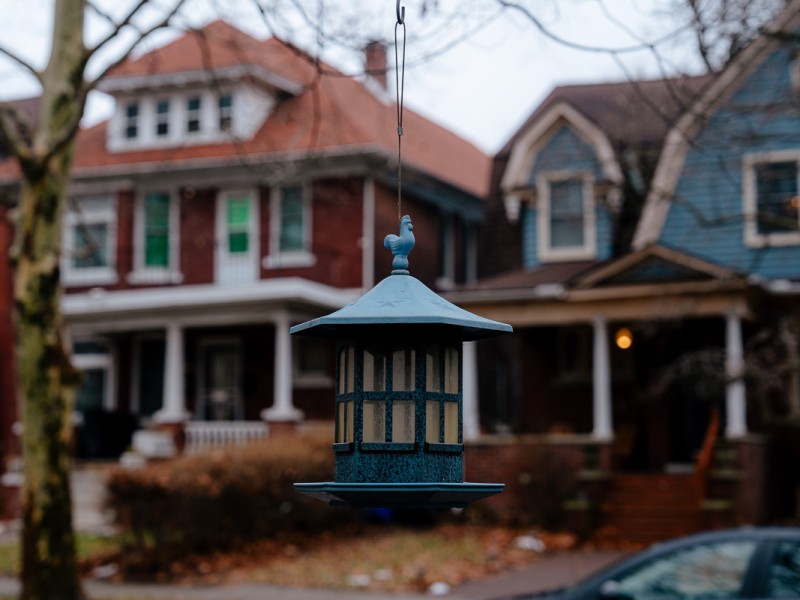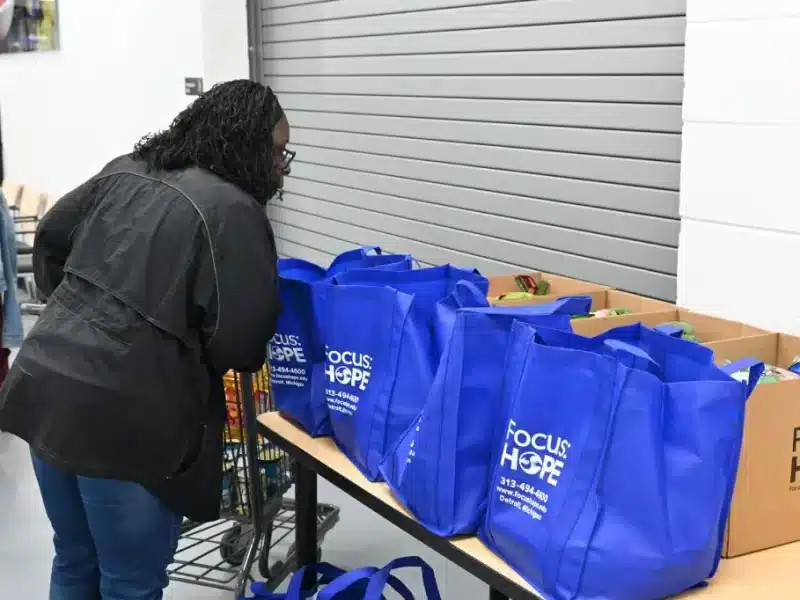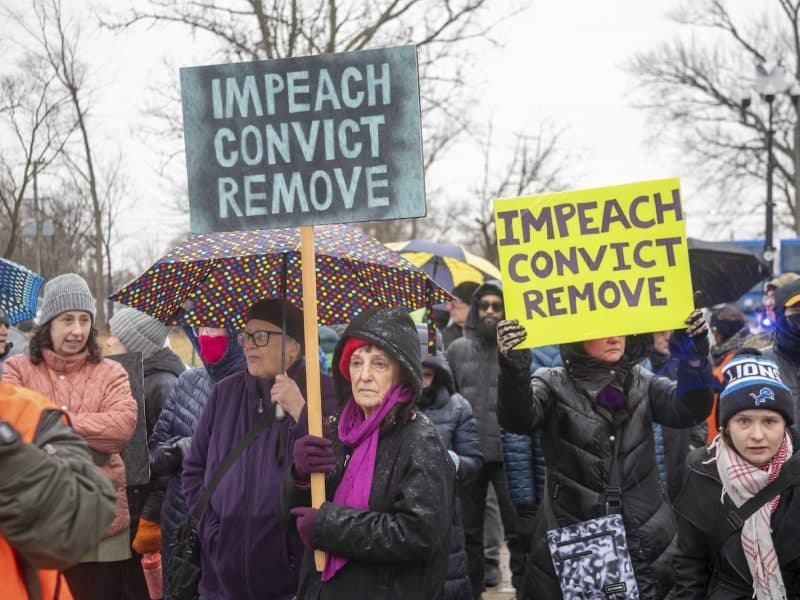Russell Bazaar Puts Small-Biz Success in a Big, Big Place
Buzz, buzz, buzz. Detroit’s Russell Industrial is a hive of activity, and now even more so. The new Russell Bazaar, an eclectic market of independent artists and unique retailers, is set to open this weekend, doubling the number of tenants in this former industrial complex.
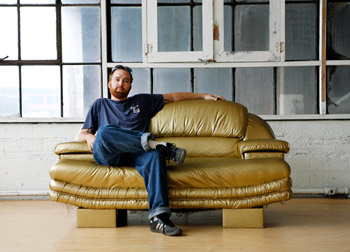 Eric Novack often describes the Russell Industrial Center as if it were its own city. The old factory turned accidental business incubator is a virtual beehive of activity with people coming and going from every corner of the 2.2 million-square-foot facility at all hours.
Eric Novack often describes the Russell Industrial Center as if it were its own city. The old factory turned accidental business incubator is a virtual beehive of activity with people coming and going from every corner of the 2.2 million-square-foot facility at all hours.
A typical day for the leasing agent for the Russell means driving in while dodging traffic coming in and out. Someone usually stops him after he parks and heads into his office a few feet from the main entrance — tenants, his boss and whoever else happens to be in the Russell that day. Before Novack knows it, an hour of his day has slipped by before he is can settle into his office and start work.
About 150 or so businesses rent space at the Russell. And now there is the Russell Bazaar, an eclectic market that promises to more than double the number of tenants in the building when it opens this weekend during the People’s Art Festival on Sunday, Sept. 21. (Note: The festival had been scheduled for last week but was moved to this weekend because of rain.)
“We went from a slop drip to a stream,” Novack says. “Now we’re about to see some flash floods.”
The Bazaar will feature a wide variety of small businesses in a small space. They’ll range from an artist gallery to a golf retailer to a hair salon in rows of side-by-side booths. Tables for even smaller retailers will line the middle of these hallways.
“When Dennis (Kefallinos, the owner of the Russell Industrial Center) put in all of that money, I was shaking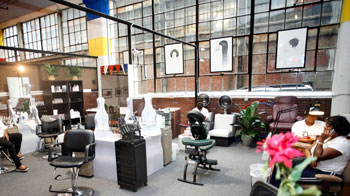 . But the response has been phenomenal,” Novack says. “I call them gut businesses because they have the guts to do it.”
. But the response has been phenomenal,” Novack says. “I call them gut businesses because they have the guts to do it.”
Tiffany Lake is one of the retailers moving into the Bazaar. Her store, Privileged Circumstances Footwear has a small boutique in Southfield, but she wanted the diversity offered not only in the Bazaar but in the city of Detroit.
It only cost $300 to set up her shop in the Bazaar. While other retailers have spent thousands (the hair salon looks like a real hair salon found in a regular storefront), some just want the ability to set up shop cheaply and efficiently.
“There hasn’t been retail like this in Detroit for a long time,” Lake says. “I think it’s going to be a unique shopping experience in the city.”
Not so bizarre bazaar
The concept of the Russell Bazaar is pretty simple. Provide cheap spaces for small retailers to set up shop and cram as many of them as possible into an already vibrant facility and, ta-da, you have created a unique shopping destination.
The easy comparison is to a mall but the owners believe it will more closely resemble an open-air market in Europe or the Middle East. The truth is it will be a hybrid of the two.
About 160 spaces for retailers (most of which are taken) are squeezed into 45,000 square feet of space in the ground floor of Building 3, the southernmost section of the old plant. Another 140 spaces are set to be built in 35,000 square feet for Phase II of the $1.5 million project later this year. That sort of density of retailers certainly accomplishes the desired bazaar effect.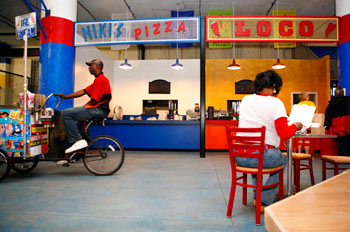
On the other hand, the new cage dividers that will hold the stores and the clean, bright colors definitely give it that mall feel. There’s even a “food court” made up of satellite restaurants of Greektown staples Nikki’s and Loco’s.
The products will help separate the Russell Bazaar from other retail Meccas. This is not Twelve Oaks or Somerset. Many of the tenants are independent artists, who have made the Russell Industrial Center what it is today.
“We’re looking for the unique buyers, not the mall buyers — the people who want the original,” Novack says.
Now that $1.5 million has been spent to build the bazaar, Novack expects the people to come, in droves. As of today about 1,000 people pass through the Russell Industrial Center each day. Nov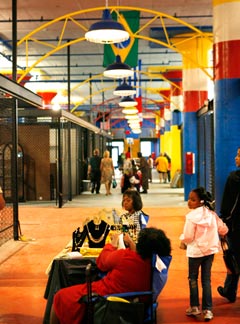 ack conservatively estimates that number to jump to 5,000 people from Friday through Sunday with a full Bazaar.
ack conservatively estimates that number to jump to 5,000 people from Friday through Sunday with a full Bazaar.
From dust to duckets
Most of those people will go through a section of the sprawling facility that was largely abandoned from the 1950s until six months ago.
The wing of the 1915 Albert Kahn-designed factory originally made chassis for the Murray Body Company. It also made wings for B-29 bombers during World War II before largely going dormant for the later half of the 20th Century.
A few small industrial companies and a handful of artist occupied small corners of the buildings when Boydell Group took it over two years ago. Most of the space was a raw, open, empty, Rust Belt stereotype, including the halls that now house the Bazaar.
“The only reason we’re still here, the only reason we’re growing, is a few artists who hung on,” Novack says.
Before Boydell construction crews attack them, the halls stand blanketed with about half an inch of dust and chipped paint, littered with empty food containers and fliers from raves held nearly 20 years ago. Broken fluorescent tube lights dot the cave-like landscape while fragments of old signs hang not far from rusted pipes that stick out of the floor.
It’s no wonder why the Detroit Police Department’s SWAT team uses these spaces for training; and it’s a wonder why Hollywood crews aren’t filming Saw sequels in them yet.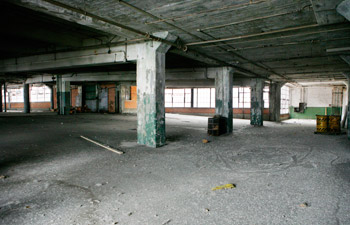
After clean-up, after the utilities are turned on, broken panes of glass are replaced, what was once an empty open space becomes a corridor so packed with studios and offices that the Russell Industrial Center’s hermit artists have to move to a new quiet place.
It’s all part of the Russell Industrial Center’s brand of manifest destiny. “For us it’s real simple,” Novack says. “All we do is make it as clean as possible and section it off so businesses can come in and stake their claim.”
From there, what they make and sell is their own business. And that’s the beauty of it.
Hear more about the Russell Industrial Center’s story at the Model D Speaker Series, at 5 p.m. Sept. 25. You must sign up to attend. Click here to do so.
The Second Annual People’s Art Festival will be open to the public from 11 a.m. until midnight on Sunday, Sept. 21. The Russell Bazaar will be open
The Russell Industrial Center and the Bazaar are at 1600 Clay St. For directions go here.
Jon Zemke is a Detroit resident and the editor for Model D’s Innovation & Jobs News section. He is also the News Editor for metromode and Concentrate. Send feedback here.
Photos:
South entrance to the Russell Bazaar
Leasing agent, Eric Novac
Detroit’s Lovely Cuts Salon
Food court
Vendors setup their booths while curious shoppers roam the Bazaar
A warehouse space awaits renovation
All photographs by Marvin Shaouni
Marvin Shaouni is the managing photographer for Metromode & Model D.
